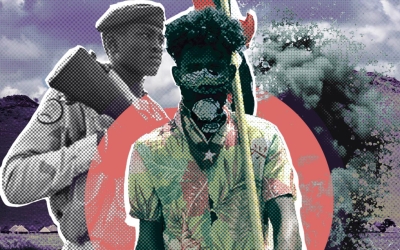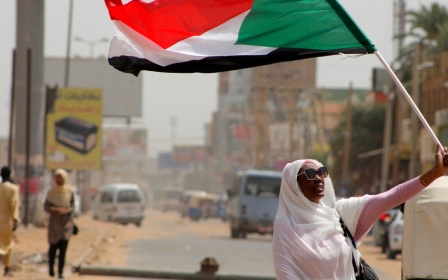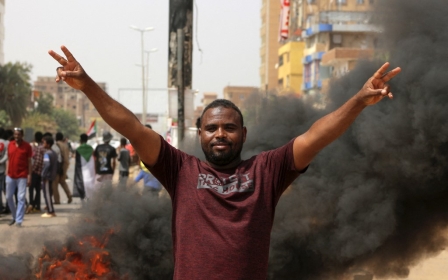Sudan political deal faces wide rejection despite international support

Sudan's resistance committees have called for nationwide protests after widely rejecting an internationally-brokered political deal between the country's military leaders and key civilian elites set to be signed on Monday.
The agreement aims to resolve the political crisis created when the military seized power in October 2021 and build a civilian-led democratic transitional government, but opponents believe it is just a reproduction of the coup and could even allow associates of the previous regime to return to power.
The signatories of the agreement, set to be inked on Monday, will include the Forces for Freedom and Change (FFC), the Islamist Popular Congress Party (PCP), the Democratic Unionist Party (DUP) and the rebel coalition of Sudanese Revolutionary Front (SRF).
The signing of the deal will be attended by the so-called "Quad powers", which include the United States, the United Kingdom, Saudi Arabia and the United Arab Emirates, with the support of the European Union, the United Nations, the African Union, and the Inter-governmental Authority on Development (IGAD) trade bloc.
FFC spokesman Shihab Ibrahim said he believes that the agreement is the first step to end the military coup and put the country back on the democratic transitional path.
"We made this agreement in order to end the coup and to stop the political and economic deterioration, paving the way for the democratic path and return to the period before the 25 October 2021 military coup," Ibrahim told Middle East Eye.
However, some political blocs are resisting the deal and have accused the future signatories of enabling the military to have the upper hand in the country.
Sudan's resistance committees, the Sudanese Professionals Association (SPA) and the Communist Party will organise nationwide protests on Monday as the deal is signed.
The resistance committees have previously vowed to continue protesting against any deal of power-sharing between civilians and the military, raising what they call the "three no's": "no negotiations, no compromise and no legitimacy".
"This agreement is only ink on paper and we will bring it down very soon, much like the agreement between the former prime minister [Abdalla Hamdok] and the military in November 2021. We will not be ruled by the military again," the resistance committees said in a statement.
They announced that they would organise five marches in December in rejection of the deal.
Meanwhile, SPA spokesman Walid Ali has also rejected the agreement, describing it a setback from the slogans and demands of the revolution that brought down Omar al-Bashir, the president who governed Sudan for 30 years, in 2019.
Evading accountability
However, many issues are still points of contention between the different powers, such as the impunity of military generals headed by General Abdel Fattah al-Burhan and the head of the Rapid Support Forces (RSF) Mohamed Hamdan Daglo, who is known as Hemedti.
The starting point for the agreement had been a draft transitional constitution proposed by the Sudanese Bar Association.
The draft, which was agreed upon after long discussions by the civilian and military blocs, puts the bases for the ruling of the transitional period that would run for around 18 months and end with general elections.
'The deal will give the upper hand to the military, including its domination of politics and the economy'
- Mohammed Badawi, analyst
According to a copy of the constitutional declaration obtained by MEE, the reformation of the army and the security sector would include the integration of the RSF and rebel movements into the armed forces.
"The implementation of policies related to security and military reform in accordance with the plan of the civilian transitional government, leading the way towards a national professional unified army," reads the first section of Chapter 10, article (69) (7) (C), of the draft.
The declaration also includes the reformation of public services, the judiciary system, the Central Bank, the auditing office and other institutions, as well as the dismantling and the structural dissolving of the 30 June 1989 regime.
A legislative assembly of 300 members would be formed by the signatories to the agreement, in addition to a council of ministers and a sovereign council.
Setback
SPA spokesman Walid Ali believes that the agreement will allow the military generals to evade accountability.
However, the FFC spokesman, Ibrahim, insisted that "there is no impunity given to any body, even Hemedti and Burhan, and that was stated in the draft of the constitutional declaration".
Ibrahim added: "The issue of the transitional justice would be widely discussed with all stakeholders, not only the politicians."
Sudanese political analyst Mohammed Badawi believes that the international community is brokering this agreement in order to contain the "probable failure" of the state or an eruption of a full-blown civil war in the country.
"It will give the upper hand to the military, including its domination of politics and the economy. It will give impunity to senior military generals, and even bring back part of the old regime associates to power, among other concerning issues, so it's a real setback from the revolution and the demands of the streets," Badawi said.
"But there are a lot of contradictions in this deal, as the international powers like the western countries and the United Nations can't grant impunity for the generals because it's against the international standards of human rights.
"The expected escalation in the streets will confuse all these powers and limit the chances for any probable breakthrough."
Middle East Eye delivers independent and unrivalled coverage and analysis of the Middle East, North Africa and beyond. To learn more about republishing this content and the associated fees, please fill out this form. More about MEE can be found here.





